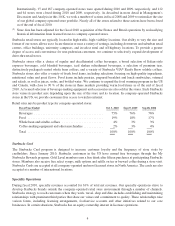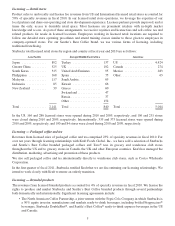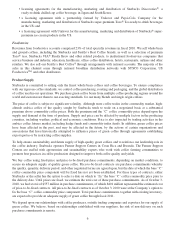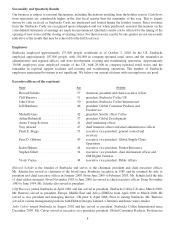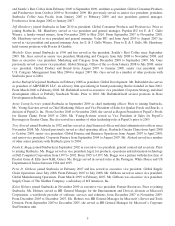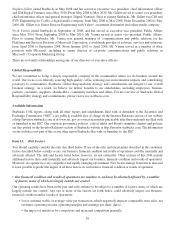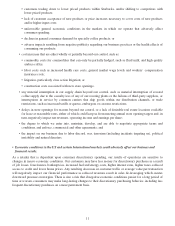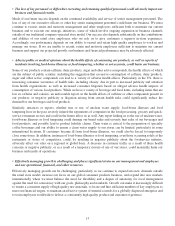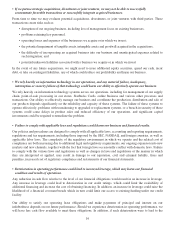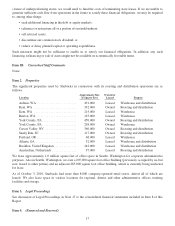Starbucks 2010 Annual Report Download - page 20
Download and view the complete annual report
Please find page 20 of the 2010 Starbucks annual report below. You can navigate through the pages in the report by either clicking on the pages listed below, or by using the keyword search tool below to find specific information within the annual report.•Failure to meet market expectations for our financial performance will likely adversely affect the market price
and volatility of our stock.
Failure to meet market expectations going forward, particularly with respect to operating margins, earnings per
share, comparable store sales, and net revenues, will likely result in a decline and/or increased volatility in the
market price of our stock. In addition, price and volume fluctuations in the stock market as a whole may affect the
market price of our stock in ways that may be unrelated to our financial performance.
•A regional or global health pandemic could severely affect our business.
A health pandemic is a disease outbreak that spreads rapidly and widely by infection and affects many individuals in
an area or population at the same time. If a regional or global health pandemic were to occur, depending upon its
duration and severity, our business could be severely affected. Customers might avoid public gathering places, such
as our stores, in the event of a health pandemic, and governments might limit or ban public gatherings to halt or
delay the spread of disease. A regional or global health pandemic might also adversely impact our business by
disrupting or delaying production and delivery of materials and products in the supply chain and by causing staffing
shortages in our stores. The impact of a health pandemic on us might be disproportionately greater than on other
companies that depend less on the gathering of people together for the sale, use or license of their products and
services.
•Our success depends substantially on the value of our brands.
We believe we have built an excellent reputation globally for the quality of our products, for delivery of a
consistently positive consumer experience and for our corporate social responsibility programs. The Starbucks brand
has been highly rated in several global brand value studies. To be successful in the future, particularly outside of US,
where the Starbucks brand and our other brands are less well-known, we believe we must preserve, grow and
leverage the value of our brands across all sales channels. Brand value is based in part on consumer perceptions on a
variety of subjective qualities. Even isolated business incidents that erode consumer trust, particularly if the
incidents receive considerable publicity or result in litigation, can significantly reduce brand value. Consumer
demand for our products and our brand equity could diminish significantly if we fail to preserve the quality of our
products, are perceived to act in an unethical or socially irresponsible manner or fail to deliver a consistently positive
consumer experience in each of our markets.
•Our business depends in large part on the success of our business partners and suppliers, and our brand and
reputation may be harmed by actions taken by third parties that are outside of our control.
Our business strategy, including our plans for new stores, foodservice, branded products and other initiatives, relies
significantly on a variety of business partners, and licensee and partnership relationships, particularly in our
International markets. Licensees are often authorized to use our logos and provide branded beverages, food and
other products directly to customers. We provide training and support to, and monitor the operations of, these
business partners, but the product quality and service they deliver may be diminished by any number of factors
beyond our control, including financial pressures. We believe customers expect the same quality of products and
service from our licensees as they do from us and we strive to ensure customers have the same experience whether
they visit a company-operated or licensed store. Any shortcoming of a Starbucks business partner, particularly an
issue affecting the quality of the service experience or the safety of beverages or food, may be attributed by
customers to us, thus damaging our reputation and brand value and potentially affecting our results of operations.
Our products and, in particular, our coffee and tea products, are sourced from a wide variety of domestic and
international business partners in our supply chain operations. We rely on these suppliers and vendors to provide
high quality products and to comply with applicable laws. Our ability to find qualified suppliers and vendors who
meet our standards and supply products in a timely and efficient manner is a significant challenge, especially with
respect to goods sourced from outside the US. A vendor or supplier’s failure to meet our standards, provide products
in a timely and efficient manner, and comply with applicable laws is beyond our control. These issues could
negatively impact our business and profitability.
14


